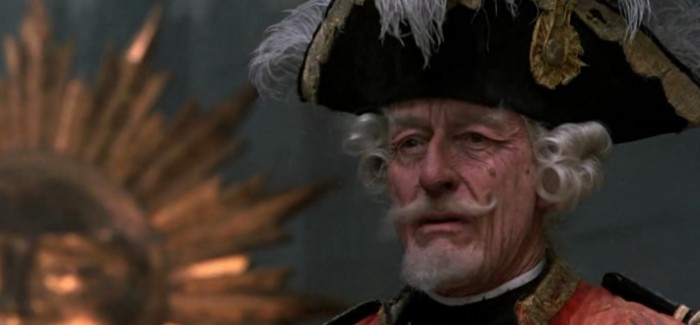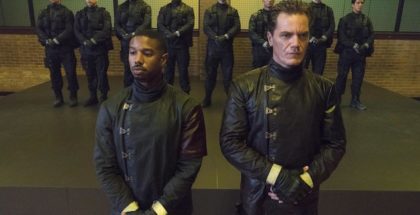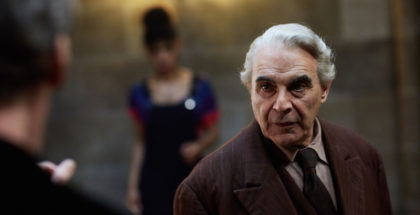VOD film review: The Adventures of Baron Munchausen

Review Overview
Visuals
10Storytelling
7Angels of death
10Spellbinding
Alex Clements | On 07, Feb 2014
Director: Terry Gilliam
Cast: Sarah Polley, John Neville, Jonathan Pryce
Watch online: Prime Video (Buy/Rent) / TalkTalk TV / Apple TV (iTunes) / Google Play
Interior: a theatre within a city under siege. A farce is playing out even as the cannonballs clatter against the walls. The chief player wears a ludicrous fake nose. He is swallowed by a whale, but through his puckish ingenuity he manages to escape. This is how Terry Gilliam’s The Adventures of Baron Munchausen (1988) opens.
The exact setting isn’t given, nor is the exact date, but we’re told it’s the age of reason and there is a distinctly Robespierreian vibe given off by the city governor, excellently played by Jonathan Pryce. In the middle of the play, the real Baron von Munchausen (John Neville) appears and begins to tell his own, even more fantastical version of the same events.
What we mean by the “real” Munchausen is interesting, though. Because even though the story is obviously made up, there really was a Baron von Munchausen, who really did fight against the Ottoman Turks in the 1730s. This Munchausen, upon returning home to Austria, told a slew of lies about his adventures. The original stories he told were translated and repeated and re-spun over and over; Gilliam’s iteration is just one in a long line of tall tales and there’s a real sense of the history of storytelling; even the visual design of the Baron comes from a 19th Century caricature.
Back to the story: the theatre is destroyed and the Baron and a young girl, Sally (Sarah Polley), escape in a hot air balloon and we follow their adventures as they try to seek out the Baron’s fantastical followers, so they can save the town.
Reader, it gets weird.
This weirdness lands in a strange place on the spectrum. A lot of it feels very Swiftian, probably owing to the original Munchausen stories originating at a similar time to Gulliver’s Travels. It does include one perfect Gilliamesque moment: the god Vulcan, somehow outside of time, making nuclear weapons. “It kills the enemy,” he says. “All their wives, and all their children, and all their sheep, and all their cattle, and all their cats and dogs. All of them. All of them gone for good.”
The rest is basically stuff happening in a series of loosely connected deus ex machina. About two-thirds of the adventures involve the Baron finding and seducing married gods (including Venus, played by a young Uma Thurman). A feminist reading of the film would be very interesting, especially looking closer at those roses the Baron is always producing to hand to his paramours.
Without the context of the real world, and the joy of seeing the fantastical invasion of reality, though, it can be hard to care. Thankfully, it all looks spectacular. Gilliam has never been the best storyteller, but the visuals of his films are always so charming and imaginative that they justify your time adequately. Munchausen is no exception.
There is a small amount of early CGI but it’s used with a light touch that many directors at the time lacked. The rest of the production is constructed with such texture and physicality that it really makes you miss this kind of film-making. It all goes back to the theatre at the beginning again, of stage-craft as an aid to the imagination.
That theme of fantasy versus reason is one that Gilliam has returned to more than once in his career. The most famous of these is probably Brazil and Munchausen works well a nice companion piece. There’s even a similar “turn” at the end, but where Brazil’s ending tempers the dreamer’s idealism, in Munchausen it gives us a sense of catharsis. Brazil’s is hard to watch, but it’s what gives the film its edge. Munchousen lacks that – it’s the lesser sibling. But it’s classic Gilliam, more slapstick (Eric Idle’s character especially) and closer to his Monty Python roots. Hundreds of years on, the Baron’s tall tales are still spellbinding.
Related Posts
Catch Up TV reviews: Stath Lets Flats, Good Evening Britain, The Big Narstie Sho... July 1, 2018 | David Farnor

VOD film review: Stake Land February 23, 2018 | Anton Bitel

VOD film review: Fahrenheit 451 (HBO) May 16, 2018 | Martyn Conterio

UK TV review: Doctor Who Season 10, Episode 4 (Knock Knock)... May 6, 2017 | Mark Harrison

















